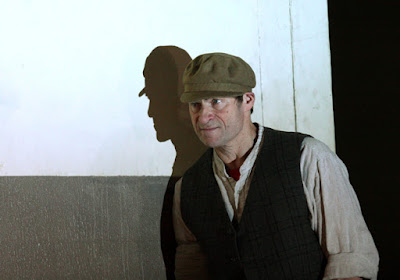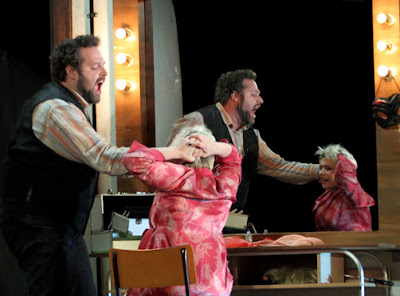 |
| Mascagni: Cavalleria Rusticana - Martina Belli, Bryan Hymel - Royal Opera House (Photo ROH/Catherine Ashmore) |
Reviewed by Robert Hugill on Dec 9 2017 Star rating:
A powerful revival of this Italian neo-realist production, with a pair of striking casts
 |
| Leoncavallo: Pagliacci - Simon Keenlyside Royal Opera House (Photo ROH/Catherine Ashmore) |
The rest of the casting was equally as full of interest. In Cavalleria Rusticana, Elina Garanca was Santuzza with Mark S Doss as Alfio, Martina Belli as Lola and Elena Zilio as Mamma Lucia. In Pagliacci, Simon Keenlyside was Tonio, Carmen Giannattasio as Nedda, Luis Gomes as Beppe and Andrzej Filonczyk as Silvio. Daniel Oren conducted.
Returning to Michieletto's prodction I found that the way he intertwined the two operas (the cast of one appearing in the other) bothered me less. Cavalleria Rusticana has stood up well and is a powerful account of this opera, whereas the music of Pagliacci notably the harlequinade, which Michieletto uses as a dream/nightmare sequence for Canio, does not quite have the psychological depth which Michieletto places on it. But the plot of Pagliacci, with its travelling players and commedia dell'arte performance, is difficult to bring off in any setting but the period one.
 |
| Mascagni: Cavalleria Rusticana - Elina Garanca, Bryan Hymel, Martina Belli Royal Opera House (Photo ROH/Catherine Ashmore) |
Elina Garanca made a powerful Santuzza, the role seemed to suit her mezzo-soprano voice well with only a slight fuzziness at the top. Her performance was notable for the classicism and sculptural quality she brought to the music. There was a dignity to Santuzza's desperation and, rather than having incandescent moments, there was a sustained intensity to Garanca's performance. Bryan Hymel made a powerful Turiddu, and the duet between Garanca and Hymel was the strong centrepiece of the whole performance. He brought out the careless indifference of the character, someone who lived in the moment.
Mark S. Doss was a very physical presence as Alfio, though his voice seemed to not be ideally relaxed and his demeanour rather stiff, though perhaps that was the idea. Certainly the pairing of this Alfio and Martina Belli's sultry, sexy Lola seemed highly unlikely to succeed. Elena Zilio repeated her moving and vividly sung Mamma Lucia.
 |
| Leoncavallo: Pagliacci - Bryan Hymel, Carmen Giannattasio Royal Opera House (Photo ROH/Catherine Ashmore) |
Simon Keenlyside does not have a conventionally heroic baritone for Tonio, but he brought a litheness and dark power to the line and a supreme intelligence. His opening prologue was gripping, full of telling vocal and physical details, in fact Keenlyside's whole performance was a very physical one. As the plot progressed, Keenlyside elicited perhaps more sympathy than some purely evil depictions, and his finally words had an element of sadness to it.
Carmen Giannattasio, returning as Nedda, did not sing her aria outside so the birds were in her imagination, and whilst Giannattasio sang with lyric grace, she also brought darker undertones to the role, and her duet with Andrzej Filonczyk's besotted Silvio had a poignant intensity to it. Luis Gomes made a lyrical Beppe, singing his serenade with finesse, yet an onlooker to the terrible proceedings which unfolded.
 |
| Leoncavallo: Pagliacci- Bryan Hymel - Royal Opera House (Photo ROH/Catherine Ashmore) |
Elsewhere on this blog:
- Russian Revolution centenary: Ilona Domnich, Paul Whelan, Nigel Foster, Gabriel Woolf - Concert review
- An evening of vital music making: the Academy of Ancient Music in Bach and Telemann - Concert review
- Sophisticated: John Blow odes from Arcangelo - CD review
- Lyrical & intimate: David Braid, songs, solos & duos - CD revew
- Despatch from Berlin: The Berlin Philharmonic in Rachmaninov & the Staatskapelle Berlin in Bartok - concert review
- Stolen Rhythm: A lovely introduction to the instrumental & orchestral music of Cheryl Frances-Hoad - CD review
- Vividly live recreations: Giuseppina Bridelli, Christina Pluhar & L'Arpeggiata in Luigi Rossi - concert review
- More than just ambient: Danny Mulhern's Reflections on a Dead Sea - CD review
- Sensitive & Beautiful: James Way & Nigel Foster in Die schöne Müllerin - concert review
- A reflection of 19th century style, and coruscating performances: Berlioz's Les Troyens from John Nelson, Michael Spyres, Joyce DiDonato, Marie-Nicole Lemieux - CD review
- Home







%20as%20Leporello%20and%20Erik%20Tofte%20(back%20to%20camera%20in%20garnet%20shirt)%20as%20Giovanni%20-%20Don%20Giovanni.jpg)



No comments:
Post a Comment